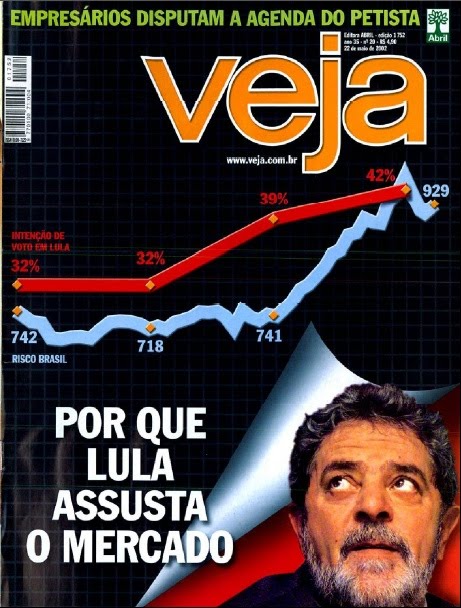Update March 2022: With Lula’s freedom to run for president, the “LulaMeter” is back.
By Louis Smith
“A metalworker with a Socialist background had to become President of Brasil to make Capitalism work. If you look at Brasil’s banks, they have never made as much money as under my government” Luiz Inácio Lula da Silva, CBS Interview 2010.
The more things change the more things stay the same. Recent polls showing Luiz Inácio Lula da Silva with a lead double that of his next opponent have rocked markets. For those of us that have been paying attention to Brasil for the long haul déjà vu is setting in. The Real has tanked, the stock market is spooked and the usual suspects in the financial media have started discussing Lula’s large lead as somehow a “risk” that investors should be pricing in. In lead up to Lula’s election in 2002, famously analyst Daniel Tenengauzer at Goldman Sachs created the LulaMeter, pegging Lula’s polling figures to market data in an attempt to predict an economic catastrophe should he be elected. Tenengauzer was reprimanded by Goldman Sachs following publication of his paper. Local media jumped on this and published front pages showing the economic risk of electing a moderate leftwing President. Lula responded to market fears in Letter to the Brasilian People – Carta ao Povo Brasileiro declaring his platform as Capitalism with a Human Face. Paranoia about Lula’s impending victory unsurprisingly sparked the usual verbose Cold War rhetoric from politicians in the United States with the late Republican Henry J. Hyde, chairman of the US House International Relations Committee, writing to President Bush calling Lula a “pro-Castro radical who for electoral purposes had posed as a moderate’, and warning of a Latin American ‘axis of evil’ between Lula, Fidel Castro of Cuba and Hugo Chávez of Venezuela, with enough nuclear and ballistic capabilities to threaten US national security and that of the entire western hemisphere.”

“Why Lula frightens the market” – Veja Magazine, 2002
Brasil Wire have covered the inbuilt bias against the Workers’ Party many times but the idea that Lula is a risk to Brasil’s economy would be a joke if the stakes were not so serious. Trailing Lula is former Army captain Jair Bolsonaro, some that the Anglo media are painting a “right-winger” or “Brazilian Trump”, the reality is he is a straight-down-the-line Fascist. The media’s preferred face, former São Paulo Governor and defeated 2006 candidate Geraldo Alckmin has next to no chance of winning beyond getting into the second round and having a “Fascist or a Crook” moment like France has had to deal with in recent times.
The media coverage in 2001-2002 was hysterical and risks descending into farce all over again. Former President and former personal friend of Lula, Fernando Henrique Cardoso has penned an Op Ed in the UK’s Financial Times titled, Lula da Silva’s vision of Brazil is a damaging fiction. Although it was speculated on social media that it actually written by Cardoso’s ghostwriter biographer Brian Winter of AS/COA, a former head of Reuters Brazil. The most galling aspect of the piece is FHC’s mentioning of the Mensalão case, at votes-for-cash blackmail scheme that was proven to have began in his party, and during his Presidency. FHC has been dutifully trying to rewrite history after leaving office with an economy in tatters, a currency collapse, mass unemployment and an IMF bailout. This OpenDemocracy article from 2003 outlines the shocking state of the Brazilian economy following FHC’s mandates.
FHC left office with US$36bn in foreign reserves. By the end of Lula’s second term international debt was cleared, Brasil had approximately US$360bn in cash reserves and was the fourth highest holder of United States debt at US$310bn – these fluctuate depending on the date. The next time a reporter or analyst makes the case that Lula “wasted the commodity boom” it should be pointed out the opposite is true; international debts were cleared and massive cash reserves were set in place to buffer the economy against future economic shocks.
It should be said they since leaving office FHC has been vain and capricious, often attacking his former friend and ally for stealing his policies and ruining the land of milk and honey he had built. He leaves a sad legacy that could have been improved by seeking to link his mandates to Lula’s successes, instead he chose the path of bitter old man desperate for credit for something he played little part in. Even that he is the “Father of Plano Real” is nothing more than a myth – Cardoso was not even President when the programme was initiated and played the role of salesman and little more.
The country may have just been through a terrible recession – one made deliberately much worst by Lawfare of the Lava-Jato investigation – however, without Lula’s economic priorities and his predecessor Dilma Rousseff‘s continuation Brasil would have had much more than an awful recession/regression, it could have seen a complete economic meltdown. What gets lost is none of this is simply continuing FHC’s policies – as people like Brian Winter will claim -, because when Cardoso left office Brasil was in deep economic trouble. Lula’s economic team, which included now Presidential candidate Henrique Meirelles as President of the Central Bank for both mandates was an investors dream team. The only break from this – and singularly important to the United States – was a deep Resource Nationalism that has spanned across Brasil’s political spectrum, including during the dictatorship. What was the exception to this? The two mandates of Fernando Henrique Cardoso.
The reality of Lula is that he is not, nor had ever been a far-left radical. His time as a Union head primarily focused on workers’ rights – hence the name of the party he would go on to found – and decent life for the average Brazilian. Even basic research on Lula’s history within his own party shows an alignment to the most moderate faction. Lula governed as a Labour Leader who’s aim for the country was to insure his workers, now the Brazilian people, received fair pay, safe working conditions and a say in their lives regardless of income. If there is any criticism to be laid on Lula for his economic policies it should be coming from the Left, not the Right. Lula’s greatest failure was to not face down the country’s Oligarchy. Yet here we are again with journalists who instead of speaking truth to Brasil’s real power, choose to side with the reactionary right and unnecessarily spooking investors like it’s 2002 all over again.
[qpp]

